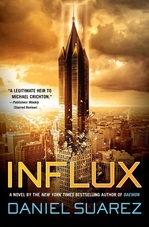 Daniel Suarez is currently my favorite tech sci-fi author, and I was thrilled to see his next book, Influx, hit bookshelves a couple weeks ago. I thoroughly enjoyed his past books, especially Daemon, because his fiction and plot lines were so realistic. He says he likes to write about the "present-adjacent," and the "hypothetical" technologies of his past books (self-driving cars, augmented reality glasses, natural language processing scripts, and autonomous drones) are now all very much real. I like his writing because it's not so fantastical that it's insulting to real engineers; Daniel's technical background and immersion in whatever new technology he's researching are what allow his writing to be authentic in this way. In Influx, he introduces a number of neat scientific advancements and technologies, like quantum computing, nanotechnology, higher dimensions, gravity modification, and antimatter. However, more interesting for me than the technologies this time was his exploration of the question of restricting technological innovation. What if the government were secretly kidnapping the greatest innovators and hoarding all the best technologies for itself in the name of national defense and stability of society? My first thought in getting into the book was the eery parallel and contrast with Atlas Shrugged, whose theme is the mind on strike against the world. In Atlas, it is the innovators and productive members of society who go on strike and disappear because they can no longer stand being taken advantage of by a growingly collectivist society. Their point is that the mind cannot be forced to think; that force and reason are opposites. In Influx, Daniel gets very close to this point when the main villain is trying to create a machine that can separate free will from consciousness so that an AI can be as innovative as the greatest human thinker. The theme of Influx flips the Atlas situation around on its head, though, because in Influx the innovators are kidnapped against their will; however, in both books, the reader can clearly see how bad the results end up being for the world at large. I found Influx to be gripping, suspenseful, interesting from technical and philosophical standpoints, and really fun to read. I heard that they may even make a movie out of it, which would be incredible (I could imagine how the movie would look as I was reading the action scenes). I highly recommend it for anyone who loves cyberthrillers and fiction about science.
0 Comments
Your comment will be posted after it is approved.
Leave a Reply. |
Archives
June 2024
Categories
All
Subscribe |
 RSS Feed
RSS Feed
